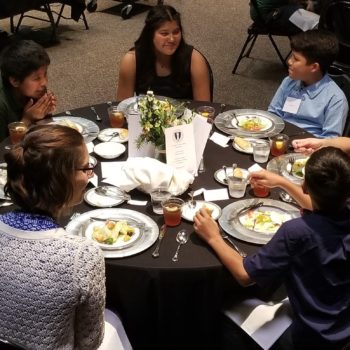Getting ready for the school year can seem like a feat to tackle, but ResponsiveEd’s science academic team believes that, with five simple goals, parents will be sure to help their children feel more equipped to conquer the academic year. The following information highlights simple tips for parents to include at home that promote scientific growth and nurturing.
- Healthy Meals
Nutritious, well-balanced meals can help the mind flourish as well as stimulate a healthy lifestyle for growing students. Encourage your child to eat a variety of colorful vegetables and fruits, lean proteins, whole grains, and to stay hydrated throughout the day while limiting their sugar intake when selecting meals and snacks. Also, try to include your child in making meals for themselves and the family in order to promote healthy choices. For younger children, try making balanced meals into a game at the dinner table (see Play with Food: A Game Teaches Healthy Diets). Who says you shouldn’t play with your food?
- Sleep Schedule
Having the right amount of sleep can make a child’s mind more receptive to learning and participating in class as well as impact their emotional and physical health. Summer vacation may have altered your family’s typical sleeping pattern. To gain back control from the summer and shift sleep cycles for the school year, start gradually having your child go to sleep 15 minutes earlier every night until they get to the appropriate bed time in which they will get eight to nine hours of quality sleep (the amount typically recommended). In addition, limit the usage of electronics and screen time before bedtime. At least 60 minutes prior to bed, have children powerdown their devices so that they can power themselves down for the night and have more productive days.
- Promoting Curiosity
Encouraging your child to question and to explore will foster success in science. Lead enthusiastic conversations with your child at home about what they observe outside and what they see occurring at home. Children should explore the world around them and bring what they learn in science to life. Prompting your child to ask questions will help build confidence in class as well as develop skills on how to formulate questions and solve problems.
- Science Journals
While having your child explore their own curiosities of the world, suggest to your child to create an observation journal for home. Recommend that learning is continuous and have your child make discoveries to share with the family while outside of school to develop lifelong learners as well as advance writing and reflective skills.
- Scientific Events
Discuss one of this year’s amazing scientific events, the 2017 Solar Eclipse or landfall of Hurricane Harvey, with your child. Click on this link to see a calendar of upcoming astronomy events for this school year or click on this link to visit The Weather Channel online . Having your child incorporate scientific news into family conversations will help develop passion and build connections on concepts taught in class.




